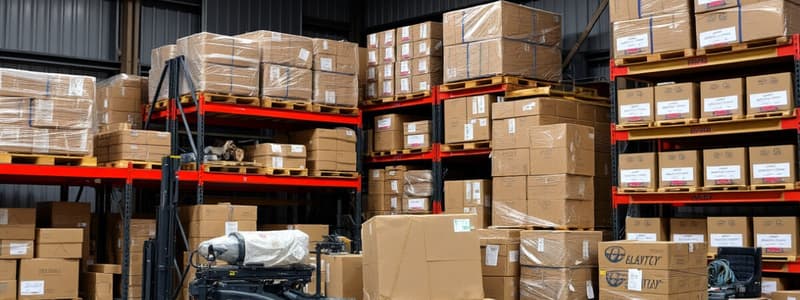Podcast
Questions and Answers
What is the primary purpose of production logistics?
What is the primary purpose of production logistics?
- To manage insurance policies for rented equipment.
- To create rental contracts with suppliers.
- To coordinate equipment delivery, setup, and return. (correct)
- To assess the budget for production costs.
Which type of insurance covers loss or damage specifically to rented equipment?
Which type of insurance covers loss or damage specifically to rented equipment?
- Property Insurance
- Health Insurance
- Equipment Insurance (correct)
- Liability Insurance
What is a key component typically included in rental contracts?
What is a key component typically included in rental contracts?
- Third-party insurance requirements
- Duration of the rental period (correct)
- Daily budget guidelines
- Equipment usage history
Which budgeting strategy is considered best practice for production?
Which budgeting strategy is considered best practice for production?
What best practice is recommended for kit management?
What best practice is recommended for kit management?
Why is it important to review insurance policies before renting equipment?
Why is it important to review insurance policies before renting equipment?
What should be included in a production budget besides rental costs?
What should be included in a production budget besides rental costs?
What should one do before signing a rental contract?
What should one do before signing a rental contract?
Flashcards are hidden until you start studying
Study Notes
Production Logistics
- Definition: Coordination of equipment delivery, setup, and return.
- Key Steps:
- Assess project needs and schedule.
- Identify equipment suppliers and rental terms.
- Plan transportation and storage logistics.
- Considerations:
- Timing for equipment pickup and return.
- Accessibility of rental locations.
- Backup plans for equipment failure.
Equipment Insurance
- Importance: Protects against losses, damages, or theft during rental period.
- Types of Insurance:
- Liability Insurance: Covers injury or damage to third parties.
- Equipment Insurance: Covers loss or damage to rented equipment.
- Best Practices:
- Review insurance policies before renting.
- Ensure coverage is sufficient for the type of equipment.
- Document the condition of equipment before and after use.
Rental Contracts
- Definition: Legal agreements outlining terms of equipment rental.
- Key Components:
- Duration of rental period.
- Rental rates and payment terms.
- Responsibilities for damages and maintenance.
- Cancellation and refund policies.
- Recommendations:
- Read contracts thoroughly before signing.
- Negotiate terms if necessary.
- Keep a copy of the signed contract for records.
Budgeting For Production
- Elements to Include:
- Rental costs (daily, weekly, or monthly rates).
- Insurance fees.
- Transportation and logistics expenses.
- Additional costs (damages, late fees, etc.).
- Strategies:
- Create a detailed budget early in the planning process.
- Allow a contingency fund for unexpected expenses.
- Track all expenses throughout the production.
Kit Management
- Definition: Organization and tracking of equipment used in production.
- Best Practices:
- Create an inventory list of all rented equipment.
- Assign responsibilities for equipment checks and returns.
- Use tracking software or spreadsheets for efficiency.
- Tips:
- Regularly update the inventory as equipment is used and returned.
- Ensure all items are accounted for before returning to avoid fees.
- Label equipment clearly to prevent mix-ups during production.
Production Logistics
- Coordination of equipment delivery, setup, and return ensures smooth production operations.
- Key steps include assessing project needs and schedule, identifying equipment suppliers, and planning transportation logistics.
- Important considerations involve timings for equipment pickup and return, accessibility of rental locations, and having backup plans in case of equipment failure.
Equipment Insurance
- Essential for protecting against losses, damages, or theft during the rental period.
- Liability Insurance covers third-party injuries or damages, while Equipment Insurance protects rented equipment from loss or damage.
- Best practices recommend reviewing insurance policies, ensuring adequate coverage, and documenting equipment condition pre- and post-use.
Rental Contracts
- Legal agreements that outline the terms of the equipment rental.
- Key components include rental duration, rates, payment terms, and responsibilities regarding damages and maintenance.
- Recommendations emphasize thoroughly reading contracts, negotiating terms as needed, and retaining a signed copy for records.
Budgeting For Production
- Must include rental costs, insurance fees, transportation and logistics expenses, and potential additional costs such as damages and late fees.
- Strategies for effective budgeting involve creating a detailed budget early, setting aside a contingency fund for unforeseen expenses, and tracking all expenses throughout production.
Kit Management
- Focuses on the organization and tracking of equipment used in production.
- Best practices include creating an inventory of rented equipment, assigning checks for equipment conditions, and utilizing tracking software or spreadsheets.
- Tips for efficiency involve regularly updating inventory, ensuring accountability of all items to avoid extra fees, and labeling equipment clearly to prevent mix-ups.
Studying That Suits You
Use AI to generate personalized quizzes and flashcards to suit your learning preferences.




